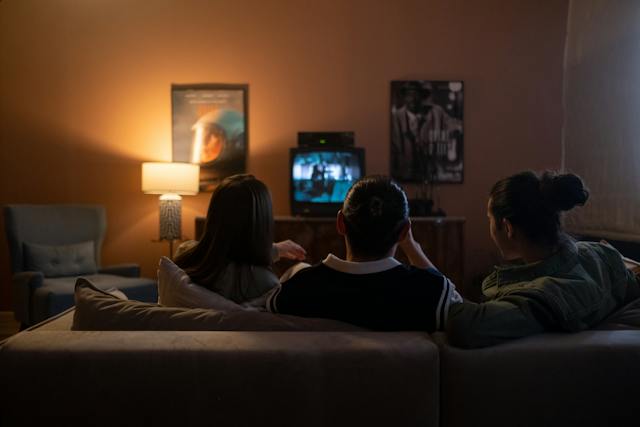Introduction to Classic Television
Television in the 1950s
Television in the 1960s
Television in the 1970s
Television in the 1980s
Television in the 1990s
Classic TV – Conclusion
Late-night talk shows are truly an American contribution to the world of TV. They founded their origins from variety shows which started to take off during the 1940s and the 1950s. They were called “variety shows” because they showcased different kinds of entertainment such as comedy sketches, music and dance numbers, acrobatics, magic tricks, juggling, etc. Variety shows were typically shown on the prime-time slot (usually 7:00 to 10:00 in the evening), where most families would usually stay in their own living rooms and watch TV after a tiring day of work and household chores.
The Evolution of Television Entertainment
One of the earliest-known variety shows at the time was Toast of the Town on CBS. Hosted by Ed Sullivan, Toast of the Town was first aired in 1948 and was later renamed as The Ed Sullivan Show. It enjoyed 23 successful years before ending in 1971.
Variety shows paved the way for the birth of the late-night talk shows. One of the earliest shows to air on the late-night slot was Broadway Open House on NBC, in 1950. Although Broadway Open House was not successful, it provided the starting point for the late-night talk show format.
From Tonight Starring Steve Allen to Johnny Carson’s Reign
Tonight Starring Steve Allen began airing on NBC in 1954 and was the first version of The Tonight Show. It is generally considered as the first talk show. It had the elements of the quintessential late-night talk show: opening monologues, stand-up comedy, celebrity interviews and a house band.
But the program really hit its stride when Johnny Carson took over in 1962, and it’s from that point when The Tonight Show became a permanent fixture among the night-owls. The Tonight Show, as well as Carson himself, transformed into TV legends. Carson continued hosting The Tonight Show until his retirement in 1992, and comedian Jay Leno eventually took over the hosting chores. But the transition didn’t leave without animosity and media-fueled controversy.
The Legendary Late-Night Rivalry: Letterman vs Leno
David Letterman, who was then the host of Late Night with David Letterman (which was aired right after The Tonight Show) was once even considered by Carson as his “natural successor.” Carson made this comment despite the fact that Leno had been a permanent guest-host on The Tonight Show for many years.
In addition, Letterman had expressed his desire to move to the earlier time slot from Late Night. After Leno replaced Carson as the new host of The Tonight Show, Letterman moved to rival network CBS and hosted Late Show with David Letterman, as a straight-out competition to The Tonight Show which now had Leno behind the desk. That began the legendary late-night rivalry between the two programs, which led to the actual hard feelings that were developed between the two hosts.
Most late-night talk shows of today have still not changed, in terms of formula: opening monologues, stand-up comedy, celebrity interviews and a house band (who sometimes provide the backing music for guest artists and performers).
Check out our articles Johnny Carson Fun Facts and Fun Facts about Conan O’Brien That You Didn’t Know for more interesting trivia about these popular talk show hosts!
Late-Night Talk Shows in the 2000s
With her appearance on “Later” in the year 2000, Cynthia Garrett made history as the first African-American woman to host a permanent late-night show on NBC. The next year, the show was terminated and replaced with the Canadian sketch comedy series “SCTV.” The tragic events of September 11 led to the resumption of late-night talk programs, with David Letterman leading the way by addressing the disaster on air initially.
In 2002, NBC introduced “Last Call with Carson Daly,” and in 2003, Jimmy Kimmel became the host of “Jimmy Kimmel Live!” on ABC. In 2005, Stephen Colbert began “The Colbert Report” on Comedy Central, while Craig Ferguson rechristened “The Late Late Show” as “The Late Late Show with Craig Ferguson.” “Real Time with Bill Maher,” “Lopez Tonight,” “The Tonight Show with Jay Leno,” and “Late Night with Conan O’Brien” are more prominent late-night programs. Since 2015, this genre has been nominated for the Primetime Emmy Award for Outstanding Variety Talk Series. These popular programs have contributed to the nation’s ongoing epidemic of sleep deprivation.
The Current State of Late-Night Talk Shows
Jay Leno hosted his final episode of The Tonight Show in May 2009 and was replaced by Conan O’Brien. However, Leno’s new prime-time talk show on NBC, The Jay Leno Show, faced dismal ratings and was moved to 11:35 PM. This resulted in O’Brien publicly announcing that he intended to leave NBC if The Tonight Show was moved to a timeslot after midnight. After negotiations, O’Brien left NBC, and Leno took over as host of The Tonight Show. In 2014, Jimmy Fallon became the new host of The Tonight Show, while Stephen Colbert took over as host of The Late Show, and Lilly Singh became the host of A Little Late with Lilly Singh.
In 2015, CBS saw a realignment in its late-night lineup with James Corden as the new host of The Late Late Show and Jon Stewart retiring from The Daily Show. The Late Show with Stephen Colbert achieved critical and rating success for its satire of the 2016 U.S. presidential election and the presidency of Donald Trump. In February 2019, NBC announced the end of Last Call with Carson Daly and premiered A Little Late with Lilly Singh.
Due to the COVID-19 pandemic, all late-night shows were forced to eliminate their studio audiences in March 2020 and have been either hosted from the hosts’ homes or with limited studio production. Despite the challenges, late-night shows have continued to provide entertainment and humor to viewers.
